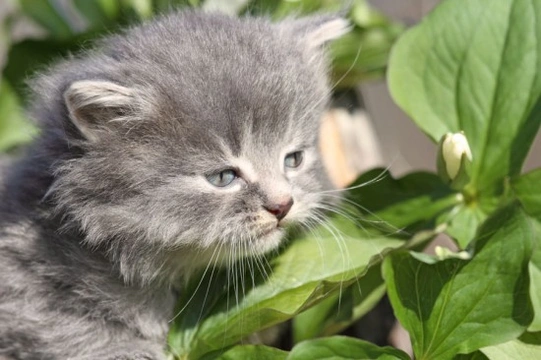
Cats and Poisonous Plants
Many cats chew houseplants, particularly if they live indoors without access to grass in the garden. Grass seems to aid digestion for some cats, and for the longer-haired varieties, it helps to regurgitate the hairballs that are often formed when fur is ingested during grooming. Cats are often attracted by 'spider plants', which resemble grass, although fortunately this is not one of the poisonous plants, and indoor cats will sometimes play with houseplants if they are bored and do not have sufficient stimulation in the form of toys and human attention.
Most green plant matter will not pass through the cat, and if your cat has eaten some, you will often see that it is regurgitated after about 10 minutes, together with some frothy bile - you will normally notice when this is about to happen as the cat will make loud retching noises, and on the whole, this is normal, and nothing to worry about. However, it is best to keep all houseplants and vases of cut flowers out of the way of cats, just in case. If your cat is one of those that like to eat grass, try growing some pots of cocksfoot grass indoors. You can buy the seeds from garden centres and pet stores, and it is completely non-toxic for cats.
Although the majority of plants will not do much serious harm, there are almost one hundred and fifty varieties that are considered to be poisonous to cats, and if your cat goes out in the garden, you will need to be aware of potential danger. Some plants are obvious, such as ivy or deadly nightshade, but there are a number of others that you might not realise are hazardous, but can be potentially fatal to your cat. In these cases, even if the cat then regurgitates the remains of the plant, considerable damage may already have been done. A few are quite obscure, and you may well not have them in any case unless you are a very serious horticulturist, but you might have some of the more common plants indoors or in your garden, without being aware of their toxicity to cats.
Two of the worst offenders are:
Lily (all varieties) - probably the most toxic of all. Even a cat brushing up against a lily, and then licking its fur, could be enough to cause a very serious reaction, including the onset of irreversible kidney failure in less than 3 days.
Poinsettia - the leaves, stem and milky sap of these popular Christmas houseplants with their bright red bracts are all extremely poisonous to cats.
If your cat shows even the smallest reaction to these two plants, or you know that the cat has been in contact with them, seek immediate veterinary assistance whatever the time of day - any delay could prove fatal.
Other plants to be aware of include the following common varieties, although this list is not exhaustive:
- Amaryllis
- Box
- Buttercups
- Cyclamen (indoor and outdoor varieties)
- Cornflower
- Crocus
- Daffodil
- Ferns
- Foxglove
- Geranium
- Laurel
- Lily of the Valley
- Marigold
- Peony
- Poppy
- Privet
- Snapdragon
- Umbrella plant
- Yew
The most common reaction to a small amount of contact with these plants is the emergence of a skin irritation, which might result in mild blistering and itching around the mouth, gums and facial area. Sometimes it can lead to sneezing and eye problems, which is particularly common when a cat comes into contact with the leaves of fruit and vegetables such as tomatoes, strawberries, rhubarb, cucumbers carrots and celery. If this happens to your cat, take him to the vet as soon as possible, as although it is unlikely to be fatal, your pet will need proper treatment to help relieve the symptoms. Don't be tempted to treat your cat with the same ointments and tablets that you might use for your own allergies as the dosage will be too high and could lead to further, more serious effects.
However, if your cat suddenly collapses, is violently sick, has a sudden attack of diarrhoea or shows signs of breathing difficulties, or if the skin allergy is sudden and severe, get in touch with your vet immediately. If possible, take a cutting of the plant involved, together with a sample of any vomit or diarrhoea for testing - and the sooner the better. Don't worry that it is out of your Vet's normal surgery hours as you need to act quickly, and your vet will understand this. If your cat is insured, you should be covered for the costs of dealing with this emergency.
A very severe reaction will only occur in the rarest of cases, as most cats will not eat anything that does not smell like proper food, and certainly not in the quantities that would cause substantial harm, but it is as well to be aware of the potential dangers and appropriate action to take. Young cats and kittens are often very inquisitive and are more likely to nibble on plant matter than older cats, and it is usually the more tender indoor houseplants or vases of cut flowers that pose the greatest risk.



